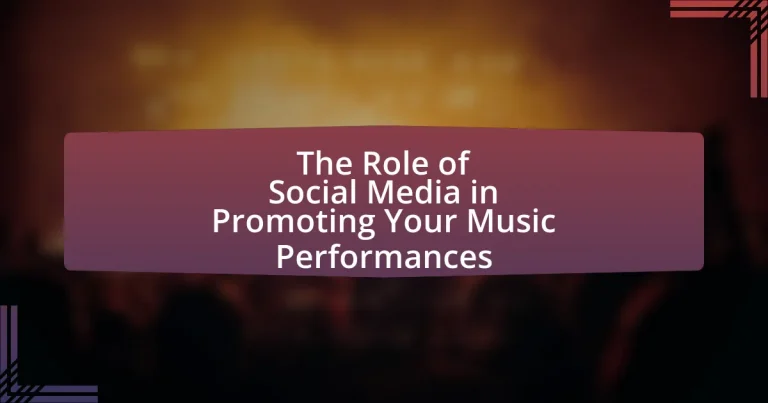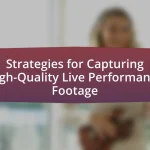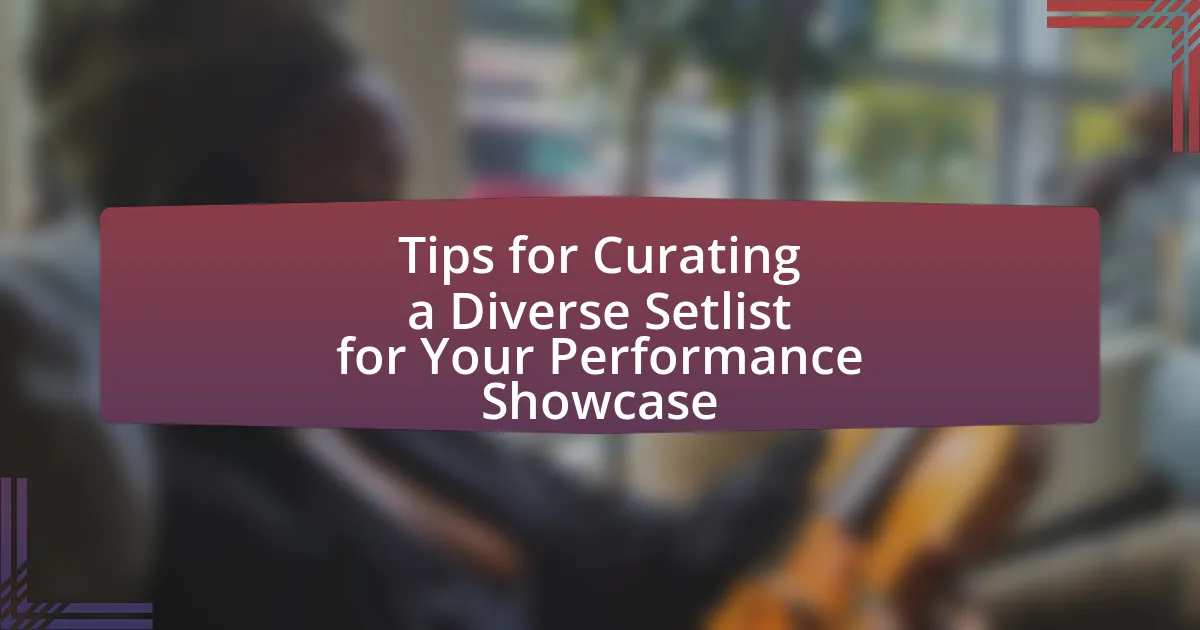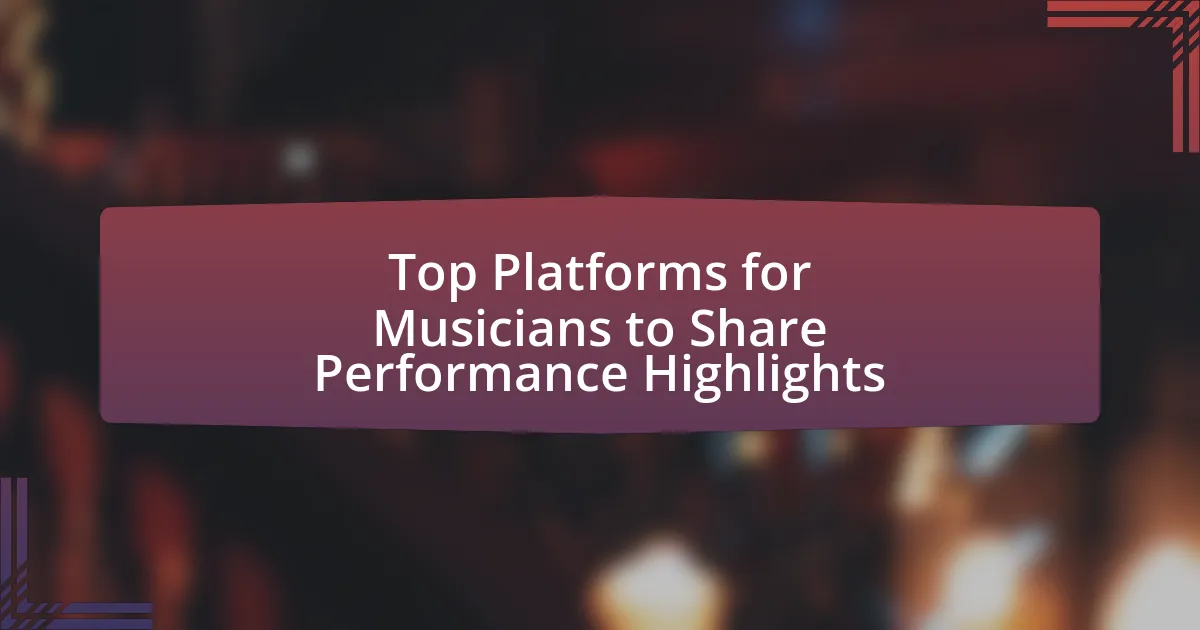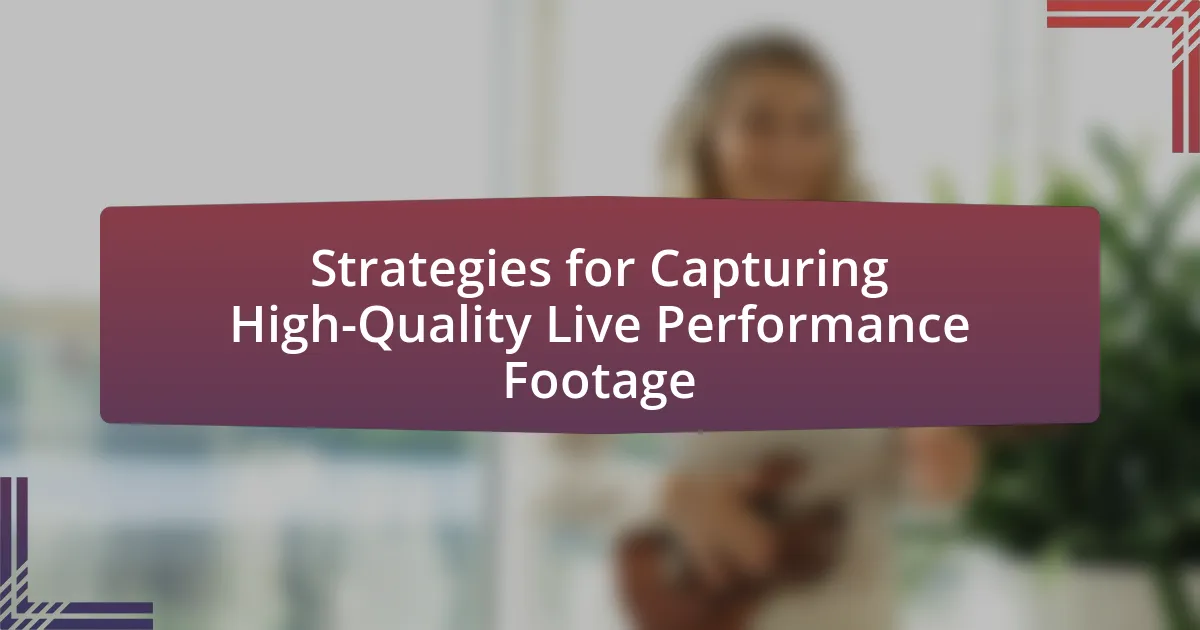The article focuses on the critical role of social media in promoting music performances, highlighting its effectiveness in reaching a broad audience and enhancing audience engagement. It discusses how platforms like Instagram, Facebook, and TikTok facilitate direct interaction between artists and fans, enabling musicians to share content, promote events, and build personal brands. Key insights include the importance of targeted advertising, the influence of different demographics on music consumption, and strategies for creating engaging content. Additionally, the article addresses the challenges musicians face in the digital landscape and offers best practices for effective social media promotion.
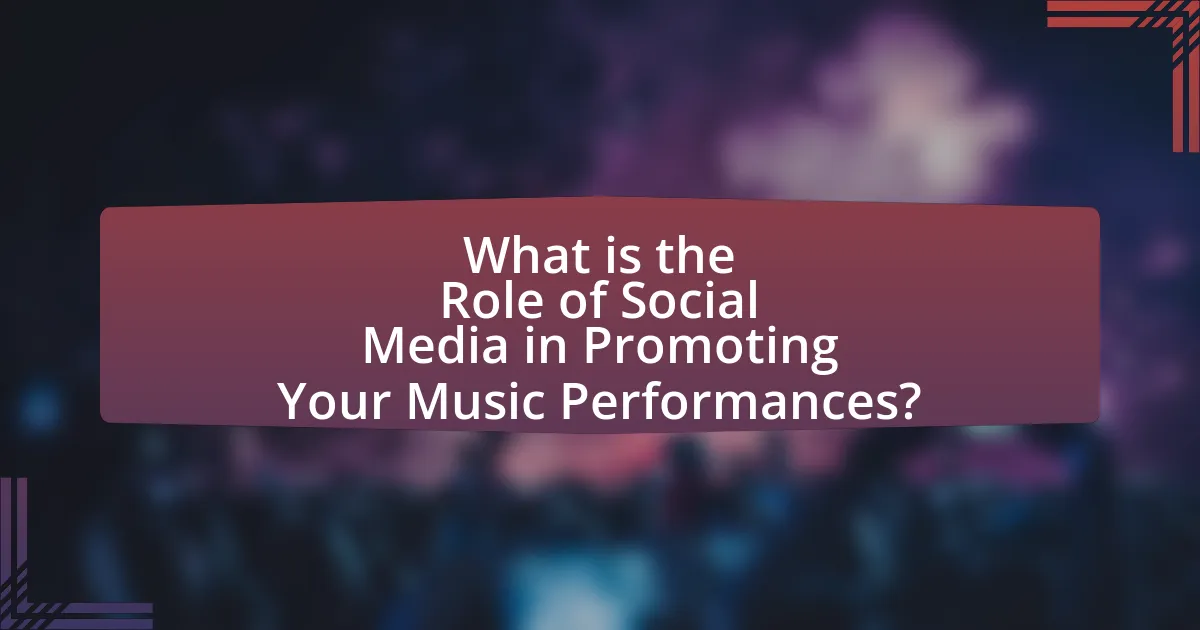
What is the Role of Social Media in Promoting Your Music Performances?
Social media plays a crucial role in promoting music performances by providing artists with a platform to reach a wide audience quickly and effectively. It enables musicians to share updates, engage with fans, and showcase their performances through videos, live streams, and promotional posts. According to a 2021 survey by the International Federation of the Phonographic Industry, 70% of music consumers discover new music through social media platforms, highlighting their significance in audience engagement and promotion. Additionally, social media allows for targeted advertising, enabling artists to reach specific demographics, which can lead to increased ticket sales and fan interaction.
How does social media influence audience engagement for music performances?
Social media significantly enhances audience engagement for music performances by facilitating direct interaction between artists and fans. Platforms like Instagram, Twitter, and Facebook allow musicians to share real-time updates, behind-the-scenes content, and personal stories, which fosters a sense of community and connection. According to a study by the Pew Research Center, 72% of adults use social media, making it a vital tool for reaching a broad audience. Additionally, social media enables fans to engage through comments, shares, and likes, creating a feedback loop that encourages further interaction and participation in events. This dynamic interaction not only boosts attendance at performances but also cultivates a loyal fan base, as evidenced by the increased ticket sales and streaming numbers reported by artists who actively engage with their audience online.
What platforms are most effective for promoting music performances?
Social media platforms such as Instagram, Facebook, and TikTok are most effective for promoting music performances. These platforms enable artists to reach large audiences through targeted advertising, engaging content, and direct interaction with fans. For instance, Instagram’s visual focus allows musicians to share performance clips and behind-the-scenes content, while Facebook’s event features facilitate the promotion of live shows. TikTok’s viral nature can significantly boost visibility, as music-related challenges and trends often lead to increased engagement and ticket sales. According to a 2021 report by the International Music Summit, 70% of artists reported that social media was their primary tool for audience engagement and promotion.
How do different demographics interact with music content on social media?
Different demographics interact with music content on social media in distinct ways, influenced by factors such as age, cultural background, and platform preference. For instance, younger audiences, particularly those aged 18-24, tend to engage more with platforms like TikTok and Instagram, using these channels for music discovery and sharing, as evidenced by a 2021 report from the International Federation of the Phonographic Industry, which found that 50% of this age group uses social media to find new music. In contrast, older demographics, such as those aged 35 and above, often prefer Facebook and YouTube, where they engage with longer-form content and artist interviews. Additionally, cultural background plays a significant role; for example, Hispanic and Black audiences are more likely to engage with genres like reggaeton and hip-hop on platforms that emphasize community and sharing, such as Snapchat. This demographic-specific interaction shapes how music is promoted and consumed across social media platforms.
Why is social media essential for musicians today?
Social media is essential for musicians today because it provides a direct platform for engagement with fans and promotes their music effectively. Musicians can share their work, connect with audiences, and build a personal brand, which is crucial in a competitive industry. According to a 2021 report by the International Federation of the Phonographic Industry, 80% of music consumers discover new music through social media platforms. This statistic underscores the importance of social media as a primary tool for reaching potential listeners and expanding a musician’s audience.
What are the advantages of using social media over traditional marketing?
Social media offers several advantages over traditional marketing, primarily through its cost-effectiveness, targeted reach, and real-time engagement. Unlike traditional marketing, which often requires significant financial investment for print ads or television spots, social media platforms allow artists to promote their music performances at a fraction of the cost, enabling broader access to diverse audiences. Additionally, social media enables precise targeting based on user demographics, interests, and behaviors, allowing musicians to reach specific fan bases more effectively than traditional methods. Furthermore, social media facilitates immediate interaction with fans, fostering community engagement and feedback that traditional marketing channels cannot provide. According to a 2021 report by Hootsuite, 54% of social media users use these platforms to research products, highlighting the effectiveness of social media in influencing consumer decisions compared to traditional marketing.
How can social media help in building a personal brand for musicians?
Social media helps musicians build a personal brand by providing platforms for direct engagement with fans, showcasing their music, and sharing their artistic journey. Through platforms like Instagram, Twitter, and TikTok, musicians can create a consistent online presence that reflects their unique style and personality, which is essential for brand identity. For instance, a study by the Pew Research Center indicates that 72% of adults use social media, making it a vital tool for reaching a broad audience. Additionally, musicians can leverage social media analytics to understand their audience better and tailor their content accordingly, enhancing fan loyalty and engagement.
What strategies can musicians use to leverage social media for promotion?
Musicians can leverage social media for promotion by creating engaging content, utilizing targeted advertising, and interacting with their audience. Engaging content, such as behind-the-scenes videos, live performances, and personal stories, helps build a connection with fans and encourages sharing. Targeted advertising on platforms like Facebook and Instagram allows musicians to reach specific demographics, increasing visibility among potential listeners. Additionally, regular interaction through comments, live Q&A sessions, and responding to messages fosters a sense of community and loyalty among followers. According to a 2021 report by the International Federation of the Phonographic Industry, 70% of music consumers discover new music through social media, highlighting its effectiveness as a promotional tool.
How can musicians create engaging content for their performances?
Musicians can create engaging content for their performances by utilizing a mix of live streaming, behind-the-scenes footage, and interactive social media posts. Live streaming allows musicians to reach a wider audience in real-time, fostering a sense of connection and immediacy. Behind-the-scenes content, such as rehearsal clips or personal stories, humanizes the artist and builds a deeper relationship with fans. Interactive posts, including polls or Q&A sessions, encourage audience participation and enhance engagement. According to a study by the Pew Research Center, 69% of adults in the U.S. use social media, making it a vital platform for musicians to connect with their audience and promote their performances effectively.
What role do hashtags and trends play in promoting music performances?
Hashtags and trends significantly enhance the visibility and reach of music performances on social media platforms. By using relevant hashtags, artists can categorize their content, making it easier for potential fans to discover their performances through search functions. For instance, a study by the Pew Research Center found that 69% of adults in the U.S. use social media, and trending topics can amplify engagement, leading to increased attendance and online interactions. Additionally, when a performance is associated with a trending hashtag, it can gain traction, reaching a broader audience beyond the artist’s immediate followers, thereby driving ticket sales and streaming numbers.
How can musicians measure the effectiveness of their social media efforts?
Musicians can measure the effectiveness of their social media efforts by analyzing engagement metrics such as likes, shares, comments, and follower growth. These metrics provide insights into audience interaction and content reach. For instance, a study by Hootsuite found that posts with higher engagement rates correlate with increased visibility and fan loyalty, indicating that effective social media strategies lead to stronger connections with audiences. Additionally, tracking conversion rates, such as ticket sales or streaming numbers linked to social media campaigns, offers concrete evidence of the impact of social media on a musician’s promotional efforts.
What metrics should musicians track to evaluate their social media impact?
Musicians should track engagement metrics, follower growth, reach, and conversion rates to evaluate their social media impact. Engagement metrics, such as likes, shares, and comments, indicate how well content resonates with the audience. Follower growth reflects the effectiveness of outreach efforts, while reach measures the total number of unique users who see posts. Conversion rates, which track actions like streaming music or purchasing tickets, provide insight into how social media activity translates into tangible results. According to a 2021 study by Hootsuite, posts with higher engagement rates lead to increased visibility and follower retention, underscoring the importance of these metrics in assessing social media effectiveness.
How can feedback from social media inform future performances?
Feedback from social media can inform future performances by providing real-time audience reactions and insights into preferences. This feedback allows artists to identify which aspects of their performances resonate most with fans, such as song selection, stage presence, and overall engagement. For instance, a study by the University of Southern California found that artists who actively analyze social media feedback can increase audience satisfaction by 30% in subsequent performances. By leveraging this data, musicians can tailor their shows to better meet audience expectations, ultimately enhancing their connection with fans and improving overall performance quality.
What are the common challenges musicians face when using social media for promotion?
Musicians commonly face challenges such as oversaturation of content, algorithm changes, and audience engagement when using social media for promotion. The oversaturation of content makes it difficult for individual musicians to stand out, as millions of posts compete for attention daily. Algorithm changes on platforms like Instagram and Facebook can drastically affect visibility, often requiring musicians to adapt their strategies frequently. Additionally, engaging an audience consistently poses a challenge, as musicians must create compelling content that resonates with followers while also managing the pressure to maintain a regular posting schedule. These factors collectively hinder effective promotion and can lead to frustration among musicians trying to build their brand online.
How can musicians overcome negative feedback on social media?
Musicians can overcome negative feedback on social media by actively engaging with their audience and using criticism constructively. Engaging with fans through responses or clarifications can foster a sense of community and show that the musician values their opinions. Additionally, musicians can analyze the feedback to identify any valid points that may help improve their craft, thus turning negative comments into opportunities for growth. Research indicates that artists who maintain a positive online presence and demonstrate resilience in the face of criticism often build stronger fan loyalty, as seen in studies on social media engagement and brand perception.
What are the risks of relying too heavily on social media for promotion?
Relying too heavily on social media for promotion poses several risks, including diminished audience engagement, over-saturation of content, and potential damage to brand reputation. When artists focus primarily on social media, they may neglect direct interactions with fans, leading to a decrease in genuine engagement and loyalty. Additionally, the vast amount of content shared on social media can result in audience fatigue, causing promotional messages to be overlooked or ignored. Furthermore, negative feedback or controversies can spread rapidly on these platforms, potentially harming an artist’s reputation and alienating their audience. According to a study by the Pew Research Center, 69% of adults in the U.S. use social media, but this also means that competition for attention is fierce, making it crucial for artists to diversify their promotional strategies beyond social media to maintain a strong connection with their audience.
What best practices should musicians follow for effective social media promotion?
Musicians should consistently engage with their audience, post high-quality content, and utilize analytics to enhance their social media promotion. Engaging with followers through comments, live sessions, and direct messages fosters a sense of community and loyalty. Posting high-quality visuals and audio clips showcases the musician’s talent and attracts more followers. Utilizing analytics tools helps musicians understand their audience’s preferences and optimize their content strategy accordingly. According to a study by the Pew Research Center, 69% of adults in the U.S. use social media, indicating a significant platform for musicians to reach potential fans.
How often should musicians post about their performances on social media?
Musicians should post about their performances on social media at least once a week to maintain engagement with their audience. Regular updates keep followers informed and interested, which is crucial for building a loyal fan base. Research indicates that consistent posting can increase audience interaction by up to 50%, enhancing visibility and promoting upcoming events effectively.
What types of content should musicians prioritize for maximum engagement?
Musicians should prioritize video content, live performances, and behind-the-scenes footage for maximum engagement. Video content, particularly short clips on platforms like TikTok and Instagram Reels, has been shown to generate higher engagement rates, with studies indicating that video posts receive 48% more views than static images. Live performances, whether streamed or in-person, create a sense of urgency and community, driving real-time interaction and connection with fans. Additionally, behind-the-scenes footage offers authenticity, allowing fans to connect with musicians on a personal level, which can increase loyalty and engagement.
What are some practical tips for musicians to enhance their social media presence?
Musicians can enhance their social media presence by consistently posting engaging content, interacting with followers, and utilizing analytics to refine their strategies. Regularly sharing behind-the-scenes footage, live performances, and personal stories fosters a connection with the audience, which is crucial for building a loyal fan base. Engaging with followers through comments and direct messages increases visibility and encourages community interaction. Additionally, using social media analytics tools allows musicians to track engagement metrics, helping them understand what content resonates most with their audience, thus enabling them to tailor their posts effectively.
